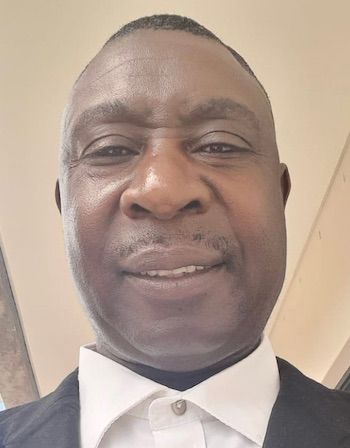Serge Ndnyegamiya

Summary: Serge Ndnyegamiya, a refugee labour rights activist from Burundi, fights for the rights of refugees and immigrant workers. In 2010, Ndnyegamiya and colleagues formed the Africa Revival Foundation, an organisation that started by giving food to vulnerable locals and immigrants and rose to be the provider of legal support to immigrant workers in the Cape Peninsula. Its mission is to transcend barriers to overcome ignorance, xenophobia, poverty, and unemployment. A victim of xenophobic violence himself, Ndnyegamiya’s work involves challenging farm and company bosses for unfair labour practices as well as the police and labour officials for discrimination. Although he now works full time on stipends, he used the money he got from selling shoes and clothes in the street to start his humanitarian work. Ndnyegamiya’s work is often threatened, and he is continually exposed to risk.
Profile: Serge Ndnyegamiya, a former student activist, fled Burundi in 1989 following the Marangara-Ntega massacres in which 200,000 people, mostly students, were massacred by the regime of that country. In 2000, upon his arrival in South Africa, Ndnyegamiya was greeted by an orgy of xenophobic violence that reached its peak in 2008. On realising the plight of refugees and immigrants, Ndnyegamiya stepped in: “I started my struggle in 2007 in Cape Town’s Claremont and Kenilworth suburbs, where African refugees and immigrants were facing homelessness, hunger, misery, discrimination, slavery, and exploitation.”
Ndnyegamiya mobilised refugees and immigrants into united groups in order to work with local churches and local communities for self help-projects and job creation. When the xenophobic violence broke out in 2008, Ndnyegamiya organized refugees and local volunteers to provide food and clothes in the Capricorn Vrygrond communities. His strategy was to work with both locals and refugees in cultural and spiritual dialogues in order to gain acceptance and trust in the host community.
Today, Africa Revival Foundation runs a community nutrition project, a refugee rights awareness and legal assistance program, and community dialogue workshops in human rights and workers’ rights. Its goals are to build social cohesion and to empower both refugees and locals toward self-reliant communities, and it works to transcend barriers to overcome ignorance, xenophobia, poverty, and unemployment. “With regards to legal assistance,” says Ndnyegamiya, “we are assisting and defending legally more than 500 refugee victims of unfair discrimination, and exploitation at different levels in the courts of law.”
In 2016 Ndnyegamiya and his colleagues launched a legal battle against a security company for unfairly dismissing immigrant workers. “After two years of legal battle,” says Ndnyegamiya, “the court awarded redress to the dismissed refugees. From there, refugees got to know the Africa Revival Forum and till now we have dealt with more than 500 cases.” He himself came face to face with the injustice and exploitation of immigrant farm workers when one day a farm owner “loaded them [immigrant farm workers] on a track telling them he was going to pay them in Cape Town. However, he organised immigration police in the middle of the road and they were arrested instead of being paid.” Ndnyegamiya helped provide an immigration lawyer for the workers and successfully secured their release.
Ndnyegamiya’s work is often threatened, and he is continually exposed to risk. At one time when Ndnyegamiya went to the police to secure the release of some foreign nationals who had been wrongfully arrested, he was harassed: “My colleague and I were informed and when we went to the police, the police, seeing that I was a foreigner, threatened to arrest me. I showed my identity papers and they photographed them and let me go.”
Some of the employers who know about Ndnyegamiya’s work threaten to harm him. Ndnyegamiya: “There are some employers who act like Mafia, threatening not only the immigrant workers but also their defenders. They know it is us, but they cannot get us because we act prudently. Sometimes they connive with CCMA commissioners, with the police, or even some unscrupulous lawyers.”
One incident was particularly harrowing: “I started a business selling goods in the community,” says Ndnyegamiya, “and due to jealousy and hate, a group of local South African people came shouting ‘Kwerekwere’, and they took all my goods and stabbed me on the head. I spent a few days in hospital.” (“Makwerekwere” is a derogatory term for foreigners often used by locals in South Africa.) “At one time, our community work centre was vandalised and assets taken just because we are foreigners, even if we were working hand in hand with our local South Africans. Only our workshop centre was targeted, leaving South African businesses untouched.”
Even though Ndnyegamiya had no funding, he used his meagre savings to sustain his community help projects. “I worked almost 10 years in community work with no funding,” he recalls. “I depended on my small business on the street selling shoes and clothes and using the small money both to survive and do community work.”
In spite of the fact that he survives on stipends and the risks he faces, Ndnyegamiya is determined to continue on a path to humanity:
“I am not intending to resign, because my passion is to help others fight for justice, for their rights and dignity. Anyway, I have done human rights work for many years without being paid. I do it because it's healing work for me, as I do not want others to experience the injustice and violence that I experienced in my life. So I will continue defending and empowering vulnerable groups notwithstanding the risks associated with it.”
